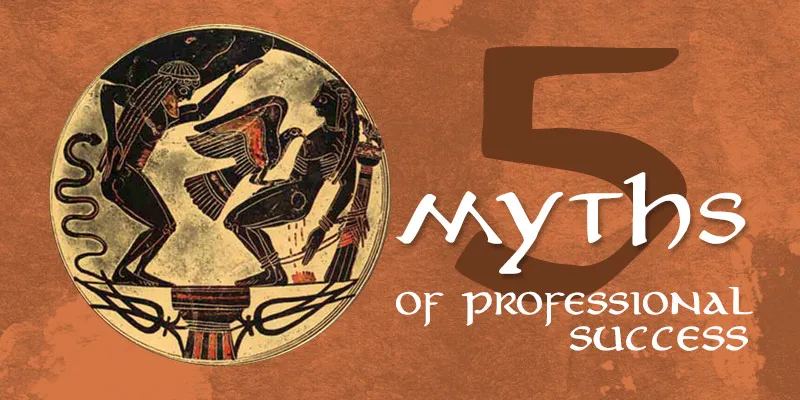Professional success does not mean having a well-paying job. It is an ongoing evolution that starts from the first day of your job to attaining your professional goals with years of experience. If you work only to pay your bills, do not enjoy what you do, and find your talents wasted, your career is definitely in a rut. You may have started with the most reputed firm, but find yourself living a stagnant professional life with no progression. Well, you are not alone.
A lot of us make wrong career choices and spend our whole life living that mistake thinking it is too late to change. And thus crawl in our inhibitions and misconceptions that only if we would have done it ‘this’ way, our career would have parachuted to the pinnacles of glory. So here are five most misleading beliefs that thrive in the professional environment, the myths of professional success.

Myth 1: intelligence is equal to success
Reality: If Isaac Newton would have let that apple fall from the tree and never bothered to know why, he would have never been known as one of the most influential physicist and mathematicians of the world with laws of motion and universal gravitation to his credit.
Success = Intelligence + Application.
Holding on to your intellect thinking it is too precious to be shared will never let you grow. Not all intelligent people succeed. It is very important to exploit the inner self and use your intelligence to produce results.Thus the implementation of intelligence is equally essential for success.
Myth 2: a good college is the only way for great professional career
Reality: Try telling that to Steve Jobs and Bill Gates, the two college drop-outs who are the face of the greatest technological inventions in the field of computers. It is people who make an organization and not vice-versa. There are numerous people who are not successful in any college student portfolio, but make a great career for themselves. The unprivileged do not receive the best of education, but that does not stop them from achieving their goals and excelling in their fields.
Myth 3: success only comes to good students
Reality: Then you probably do not know Albert Einstein’s teachers found him dumb and a slow learner. But that did not stop him from becoming the most celebrated scientist of the twentieth century. It is knowledge that brings success and not marks. Good students may be best at curricular study and well, just that. The average students on the other hand, may be comparatively quick learners and more susceptible to gaining knowledge by not just restricting themselves to textbooks.
Myth 4: a good start leads to a good career
Reality: How about I tell you the story of how a tea seller goes on to become a prime ministerial candidate?
Well staying politically correct, success (sustainable business) = entrepreneurship + business retention.
There have been times when two candidates are pitted against each other based on their career start. But a great start may not always ensure a great career. We need to keep learning at every stage and know the best and worst of all worlds to have a sustainable career.
Myth 5: take few steps, but well thought and risk free
Reality: I am a computer science engineer who started his career with GlobalAnalytics. I then moved on to the core team at Marketelligent where I was in charge of marketing and business development along with building the Analytics consulting delivery team. Building a firm foundation and the ability to take risks by giving up a well-paying job to live my entrepreneurial dream, I moved on to start up Simplify360. Before starting Simplify360, we tried our hands at a few more products, that didn’t quite click, until 2012 when we raised our first angel funding.
Since then, there has been no looking back and we now have over 100 clients, including some of the big names such as the ITC Foods and HDFC Bank. Thus change is the only constant thing, so never fear risks. Well thought and risk-free decisions often lead to no decision at all.
Good or bad, the result of a decision can be known only when it is implemented and the result analyzed. Yes, there are no decisions that are totally risk free. But not to take risk is the greatest risk one can take in life.







